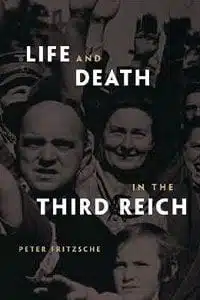
Most people have come to understand the horrors of Nazi Germany largely through the lens of the Holocaust. But like many seminal moments in history, it is the path to such an event – even one as incomprehensible as the extermination of Europe’s Jews – that often proves more valuable to understanding the event itself.
What Peter Fritzsche does so well in his new book, Life and Death in the Third Reich, is show the systematic breakdown and reshaping of a society. Although this breakdown might not have directly led to the Holocaust, it certainly suggested that outcome and made it easier to take place.
Fritzsche paints such a nuanced and exhaustively researched portrait of German National Socialism that in the end it just doesn’t suffice simply to call the Nazis architects of death. They were, of course, but the political wave they rode in on was something of a phenomenon. So adroit were the Nazis at all-consuming manipulation that they were able to essentially recast the entire destiny of a country in such a way as to make the Holocaust actually seem to make sense, at least in the context of their own barbaric political framework.
The central question in Life and Death is the extent to which everyday Germans allowed the rise of Nazism and the Holocaust to happen and whether they deserve some blame. It is a question still at the heart of German life today, more than 60 years later. You can’t understand Germans without understanding the idea of national guilt, even as harbored by a young generation lucky enough to have, in the words of former Chancellor Helmut Kohl, “the grace of late birth”.
Germans wrestle with their past, but it is a complex match; no one seeming to know what is allowed, or how far to go. Günter Grass may have ushered in an era of vergangenheitsbewältigung or “coming to terms with one’s past”, with his novel, The Tin Drum (1959), taking his position as a country’s moral compass. But his star faded in 2006 when he acknowledged youthful membership in the SS.
W.G. Sebald’s 1999 essays, “On the Natural History of Destruction” found criticism at home for focusing too much on German suffering during WWII. More recently, a spate of German movies – Der Untergang and Mein Führer, in particular – drew controversy for humanizing Hitler, the latter by turning Hitler’s life into something of a comedy.
If Germans still can’t come to some kind of peace about what was done in their name, they’re at least closer to reaching it. Today they fully know what happened; in the immediate aftermath of the war, Fritzsche writes, they did not. In the revealing closing section of Life and Death, Fritzsche gets to his main concern: What did everyday Germans know, and when?
At no point during the war does it seem Germans really knew the full extent of what was happening to Jews. Yes, they knew of the mass segregation and deportation of Jewish populations, and Fritzsche writes of their culpability in this respect. But Germans saw the murder of Jews not as a program, but rather in the context of war’s brutality — as inevitable frontline fatalities alongside the German soldiers who were also dying by the thousands.
Fritzsche suggests that the public might have had a different reaction had the atrocities of the extermination camps and Final Solution been known. “Without specific knowledge of Auschwitz, the killings [of Jews] could be regarded as events and episodes…in a brutal war which did not have the character of systematic or patterned extermination and which could conceivably leave many departed Jews alive.”
Fritzsche helps the reader see, step by step, how such logic was even possible: From the rise of National Socialism, which played on the humiliation many Germans felt after Versailles, to the systematic racial “reeducation” of an Aryan society purported to be necessary if Germans never wanted to experience that humiliation again. National Socialism’s main pillar was not so-much specific Jew hatred but a broader belief in racial purity, one that necessitated Germans seeing and believing in racial differences and their ability, if left unchecked, to bring down a society. Jews were the face of that fear. The Nazis manipulated Germans into seeing their choices, and the direction of their country, in the context of extremes: national survival or annihilation; life or death.
Fritzsche writes that to live in Nazi Germany was to be perched on the brink of each, for each was inextricably linked to the way National Socialism saw the world. So successful were the Nazis at making Germans see Jews as the dangerous weight that could tip balances away from fortune that when the gruesome realities of their fate began to appear, Germans were unable to be objective.
Most Germans were probably against the deportation of Jews, Frtzsche writes. But the realities of war trumped this: As bombs rained down on Germany, Germans had to look after themselves. “The effect was a growing indifference to the fate of Jews.”
Indifference is not the same as collusion. While everyday Germans may have been responsible for the rise of Nazism, Fritzsche concludes that such culpability has limits, and may have been unavoidable.
Fritzsche lets the voices of German diaries do the work at making this distinction throughout Life and Death. The telling detail is the degrees to which Nazis ultimately sought to hide the reality of the extermination camps, as if knowing that even the most loyal citizen of the Reich would have turned against them, had they known of their existence.
